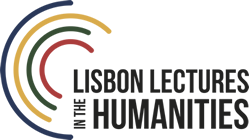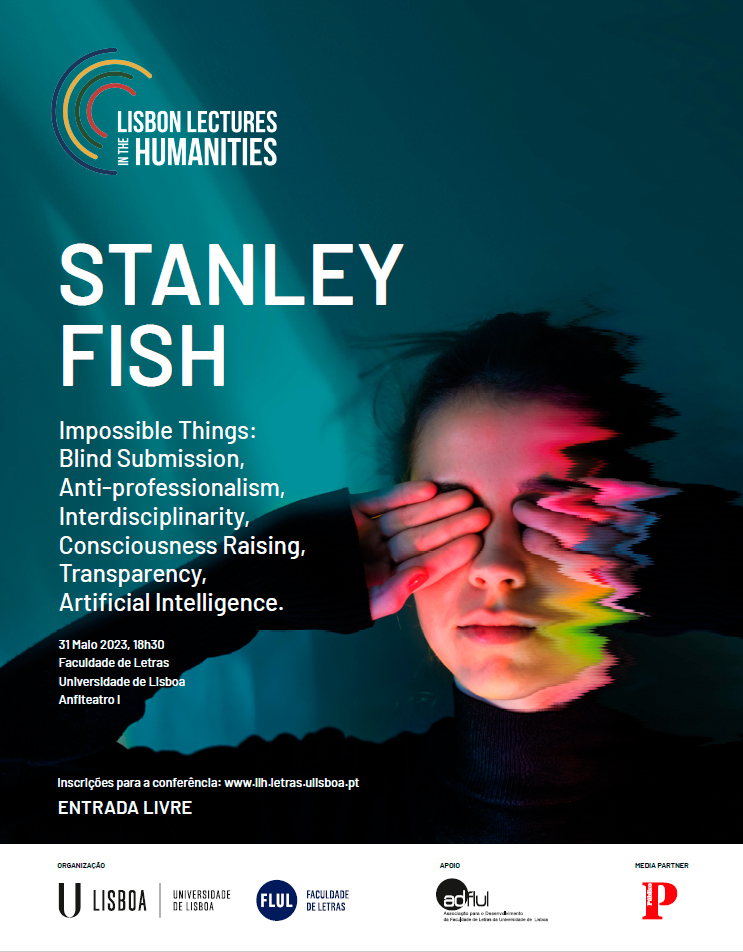CONFERÊNCIA COM STANDLEY FISH | 31 MAIO 2023
Impossible Things: Blind Submission, Anti-professionalism, Interdisciplinarity, Consciousness Raising, Transparency, Artificial Intelligence.
Na sua conferência das Lisbon Lectures in the Humanities, Stanley Fish falará acerca de um tema que tem tratado desde há várias décadas. Foi em 1979 que escreveu contra o que está subjacente a uma submissão cega, isto é, a proposta de publicação de um trabalho académico sob anonimato e apreciado também de maneira anónima. É este um dos pilares do funcionamento do mundo académico actual, suposto garante de procedimentos de selecção com base em critérios de objectividade invulnerável a vícios de análise. Estes vícios seriam introduzidos com o conhecimento da identidade de quem escreve o artigo e igualmente da identidade de quem o avalia. Fish argumenta que o conhecimento objectivo entendido nestes termos é impossível, explica por que razão tem este entendimento e reflecte a partir daqui sobre outras facetas do mundo académico actual que também crê estarem assentes em equívocos.
In his talk for the Lisbon Lectures in the Humanities, Stanley Fish will explore a topic he has been addressing for several decades. It was in 1979 that he wrote against what underlies blind submission, i.e., the anonymous proposal to publish a piece of scholarly work which is also anonymously assessed. This is one pillar of present-day academia, supposed to assure that selective assessment is based on criteria of objectivity that are allegedly impervious to interpretive biases. Such biases would be introduced with the disclosure of the identity of the author of the article, as well as of the reviewer. Fish argues that objective knowledge understood in these terms is impossible, he explains why he holds this view, and goes on from here to debunk other facets of the current academic world that he also believes are based on misconceptions.
Stanley Fish é um dos mais famosos e influentes críticos literários e teorizadores da literatura do nosso tempo. Conhecido pelas ideias que defende desassombradamente e pelas reacções que suscita, notabilizou-se pela reavaliação do papel do leitor no entendimento da obra literária. Para Fish, a interpretação é uma actividade de construção de sentido, muito mais do que uma decifração de significados pré-existentes.
Licenciou-se na Universidade da Pensilvânia (1959), obteve o grau de mestre na Yale University (1960), onde também se doutorou em 1962. Deu aulas na Universidade da Califórnia, Berkeley, na Johns Hopkins University, na Duke University, Universidade do Illinois, Chicago, e na Florida International University, em Miami.
Na sua vasta bibliografia, conta-se Is There a Text in This Class?: The Authority of Interpretive Communities (1980), que o colocou de maneira singular num friso de autores como Roman Ingarden, Umberto Eco ou Wolfgang Iser. A aproximação entre a literatura e o domínio legal é explorada em Doing What Comes Naturally: Change, Rhetoric, and the Practice of Theory in Literary and Legal Studies (1989). A questão argumentativa tem papel especial em How to Write a Sentence: And How to Read One (2011) e Winning Arguments: What Works and Doesn’t Work in Politics, the Bedroom, the Courtroom, and the Classroom (2016). O papel da universidade nos nossos dias é tratado em Save the World on your own time (2008).
Stanley Fish is one of the most famous and influential literary critics and literary theorists of our time. Known for the ideas he passionately defends and the reactions they provoke, Fish is notable for re-evaluating the role of the reader in understanding literary works. According to Fish, interpretation is an activity of constructing meaning, rather than deciphering pre-existing meanings.
He graduated from the University of Pennsylvania (1959) and obtained his MA from Yale University (1960), where he also earned his PhD in 1962. Fish taught at several universities, including University of California (Berkeley), Johns Hopkins, Duke, University of Illinois (Chicago), and Florida International University (Miami).
His extensive bibliography comprehends the much discussed and influential work Is There a Text in This Class?: The Authority of Interpretive Communities (1980), which placed him in a unique position among authors such as Roman Ingarden, Umberto Eco, or Wolfgang Iser. The intersection between literature and the legal domain is explored in Doing What Comes Naturally: Change, Rhetoric, and the Practice of Theory in Literary and Legal Studies (1989). The issue of argumentation plays a special role in How to Write a Sentence: And How to Read One (2011) and Winning Arguments: What Works and Doesn’t Work in Politics, the Bedroom, the Courtroom, and the Classroom (2016). The role of the university in our time is addressed in Save the World on Your Own Time (2008).






